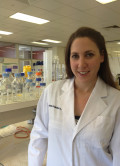
Dr Anna Leonard, B. Health Science (Hons), PhD
Lecturer in Anatomy & Pathology, Adelaide Medical School, The University of Adelaide, NRF Chair of Neurosurgical Research 2012 Student
Current position:
- Lecturer, discipline of Anatomy and Pathology, University of Adelaide
Achievements:
- Fresh Science Finalist
- Women in Neurotrauma Research Visiting International Scholar Award (WiNTR VISA)
- The University of Adelaide Doctoral Research Medal
- Dean's Commendations for Doctoral Thesis Excellence
Why neurosurgical research?
"During my undergraduate studies (Bachelor of Health Sciences), I became very interested in neurotrauma research through my studies of pathology and neuroanatomy. Unfortunately, at this time a very close friend of mine was hit by a car, suffered a severe traumatic brain injury and subsequently passed away. The fact that very little could be done for her medically increased my interest and determination to contribute to the field of neurotrauma to improve treatment and outcome for patients. Professor Robert Vink was one of my lecturers at the time, who additionally sparked my interest in Neurotrauma research and I subsequently undertook an Honours degree under his supervision in 2007."
Research area:
"My research took a slight turn in 2009 when I began my PhD, still in the field of Neurotrauma but now focused on spinal cord injury research. My research focuses on understanding the development of secondary injury mechanisms following SCI and how these processes can be targeted to reduce damage and improve outcome. In particular, my research focuses on swelling (oedema) of the spinal cord after injury. Our latest project is investigating how expansion of the space in which the spinal cord lies can help to accommodate the swollen cord after an injury. This work involves a multidisciplinary team from various experts in Adelaide including basic neuroscientists, biomedical engineers and clinicians. This exciting work demonstrates the state of the art facilities used in Adelaide and the amazing local individuals who contribute to the research team."
Current NRF-funded projects include:
Investigating the relationship between neuroinflammation and the development of cognitive deficits following traumatic spinal cord injury: Can Fyn kinase inhibition break the link? (2018)
Spinal cord injury is commonly thought of as a disorder of paralysis, however, there is emerging evidence to suggest that an injury to the spinal cord can also affect the brain, initiating an inflammatory response resulting in cognitive deficits. Our research is focused on investigating the neuroinflammatory response within the brain following traumatic spinal cord injury and how this may lead to cognitive decline. Additionally, we are interested in how location may affect these results, specifically whether a higher (cervical) or lower (thoracic) injury causes greater cognitive decline. Our final aim is to determine whether inhibition of the neuroinflammatory response will improve cognition providing a potential treatment for SCI individuals against cognitive decline.
Equipment: Infinite Horizons Device for Spinal Cord Injury Research (2017)
The Infinite Horizons Device is the gold standard device for spinal cord injury research and the only such device to currently exist in Adelaide. Employing this model is vital for producing competitive and comparative research to our counterparts in the US, Europe and Asia. I gained extensive expertise using this device during my recent postdoctoral training at The University of Alabama at Birmingham (UAB), USA in 2015. Excitingly, such support from the NRF to purchase this equipment will enable us to further our Spinal Cord Injury research at the University of Adelaide.
Publications:
For a full list of Dr Leonard's publications, please visit her Google Scholar Page.
Corrigan F, Mander KA, Leonard AV, Vink R (2016). Neurogenic inflammation after traumatic brain injury and its potentiation of classical inflammation. Journal of neuroinflammation 13 (1), 264.
Leonard AV, Turner RJ (2016). Aquaporins within the Central Nervous System: Implications for Oedema Following Traumatic CNS Injury. Aquaporins in Health and Disease: New Molecular Targets for Drug Discovery. 205-215.




